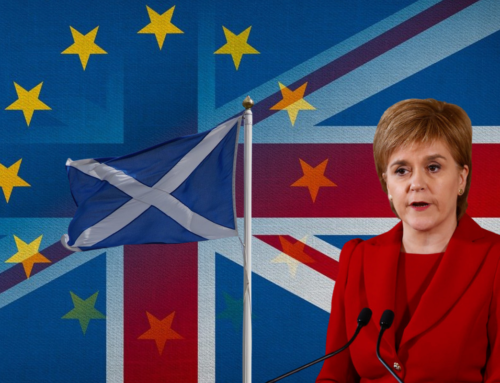“We can tolerate neither our vices nor their cures”
(Livy, Roman historian, 1st century AD)

by Brendan Donnelly
Director, The Federal Trust
2nd September 2019
The recent unexpectedly lengthy prorogation of Parliament, carried out with brutal speed and secrecy, should be a salutary reminder to those hoping to prevent a “no deal” Brexit on 31st October of the range of powers the British government possesses to manipulate Parliamentary business. There is every sign that this ruthless and determined government intends to use these powers to the full over the coming months. The ramshackle constitutional and political arrangements of the British state, cruelly exposed by the Brexit process, will allow the cabal at the head of the present government ample opportunity to ride roughshod over Parliamentary opposition.
When Parliament reconvenes tomorrow, many MPs will be hoping that sufficient anger will have been generated by the decision to prorogue Parliament to enable the House of Commons either to adopt quickly binding legislation designed to prevent the British government from leaving the EU on 31st October with “no deal,” or failing this to hold a Vote of No Confidence in the Johnson administration. It may well be that potential majorities exist for both courses of action. Neither however is of itself more than an initial step in the fight against “no deal” Brexit. Nor is there consensus among MPs hostile to “no deal” whether preventing “no deal” should be an end in itself or simply the beginning of a campaign to prevent Brexit entirely.
Parliament will try legislation first
After the dispiriting controversy of mid-August arising from Jeremy Corbyn’s claim that he should head a minority government if a Vote of No Confidence in the Johnson government were passed, MPs seem inclined to attempt initially this week the preemptive legislative route. Those most active in this initiative have been strikingly coy about the precise legislation they intend to introduce. Traditionally, the House of Commons has not expected to manage foreign policy, but rather to leave this management to the government of the day, only intervening to overturn a government, the foreign policy of which it found intolerable. Much of the confusion and frustration surrounding the Parliamentary debate about Brexit has stemmed from the fact that an important minority of Conservative MPs are profoundly uneasy at the direction of their government’s European policy, but have been unwilling to bring down that government for fear of ushering in Jeremy Corbyn as Prime Minister. It is this unwillingness that has encouraged MPs such as Dominic Grieve to seek consistently in the past twelve months Parliamentary devices only to restrict but not to overturn the government’s (mis)conduct of the Brexit negotiations.
Even if Parliament is successful in passing legislation this week that on the face of it seems to prevent a “no deal” Brexit, any such legislation will immediately confront two related problems, the reaction of the government to this legislation and the reaction of the EU. Michael Gove and others made it clear at the weekend that this government will not necessarily regard itself as bound to implement the spirit, or perhaps even the letter of any legislation purporting to frustrate its policy of leaving the EU on 31st October in all circumstances. Any loophole or imprecision in the legislation will be exploited by the government to avoid following the wishes of Parliament. If no such loopholes exist, there is a real possibility that the government will simply refuse to carry out Parliament’s wishes, citing the authority of the “popular will” expressed in the referendum of 2016. The EU for its part will be extremely unwilling to find itself drawn into this internal British controversy. There is no chance of the European Council’s being willing to extend the Article 50 negotiating period other than on the basis of a clear request from the British government of the day. Even if such a request were made, it would probably not be granted unless there were a real prospect of change in the British position on Brexit, either through an election or a new referendum.
No Confidence may be the alternative
If MPs fail in their plan to place legal shackles on the government this week, they may well revert in their frustration to holding and perhaps winning a Vote of No Confidence in the Johnson government. While immediately attractive, this would probably create in its train at least one consequence unwanted by many. It seems unlikely that any alternative administration could be formed within the fourteen days succeeding this Vote, particularly if Parliament has been prorogued. This would allow Johnson to remain as Prime Minister, both as the man in possession and the leader of the largest Party in the House of Commons. It would then fall to him to advise the Queen on when the next General Election, as mandated by the Fixed-Term Parliaments Act, would be held. He might well advise a date in early November, just after a “no deal” Brexit but before the worst economic effects of this rash step become apparent. To judge by her willingness to accept prorogation of Parliament on the obviously specious grounds urged by Jacob Rees Mogg last week, the Queen might conclude that she had no alternative but to accept this advice. A Vote of No Confidence in the Johnson government would probably not prove the Royal Road to preventing a “no deal” Brexit. It might even facilitate such an outcome if no alternative administration can be found to prevent it.
In the whirligig of the Brexit tragicomedy, it is entirely possible that Parliament will find itself confronted at the end of the week with a reversion to Jeremy Corbyn’s proposal of three weeks ago for a “caretaker” government with himself at its head. This government would seek to engineer a new General Election, either in mid-October or later in the year, with an extension of the negotiating period being sought from the EU in the latter case. Corbyn’s personal unacceptability to many Conservative and Liberal Democrats may well in any case prevent his becoming Prime Minister of a “caretaker government,” but his proposal for an early election is not anyway one that many MPs find congenial. The volatility and uncertainty of current British electoral politics has sent a shock of fear through many Labour and Conservative MPs, who have been accustomed to regarding themselves as occupying safe seats, which they now see as vulnerable to the unpredictable outcome of an election dominated by Brexit. Few MPs will be eager to risk their political futures on an election which may well cost them personally their seats, but may well only replicate the present Parliamentary impasse. A further hung Parliament seems to many MPs the most likely consequence of a fresh General Election held at a time when Brexit has not taken place and where the two major parties continue divided and unpopular.
Conservative MPs under threat
Some moderate Conservative MPs such as Philip Hammond have been quoted in recent days expressing their resentful shock at threats to deselect them if they refuse to follow the Conservative whip this week. They rightly point out that many of those now making these threats frequently ignored the Conservative whip over the past three years of Theresa May’s government. Their proclaimed shock however is either naïve or disingenuous. Those who ignored Theresa May’s calls for party unity did so because they knew that they and their allies were strong enough within the Conservative Party to pursue such conduct with impunity. Hammond and those who think like him have spent many years acquiescing in a takeover of their Party by unsavoury and extremist anti-European elements. These extremists are now finally turning on those who have smoothed their way to power by inaction or at most only feeble protest. The passivity of moderate Conservatives has had terrible consequences not merely for their own Party but for the country as a whole, as the internal crisis of the Conservative Party has metastasised into a European, political and constitutional crisis for the British state.
How the perhaps thirty or forty Conservative MPs genuinely shocked by the activities of the Johnson government will act this week will be central to the outcome of the now culminating Brexit crisis. If merely a handful of them join the Liberal Democrats, a handful decide to retire at the next election, some allow themselves to be deselected and others simply keep their mouths shut they can contribute nothing to resolving the crisis which they have allowed their party to inflict on the country. There is however an alternative course of action open to them, action which the extreme and unprincipled action of the Johnson government has paradoxically made easier for them. The formation of a moderate Conservative faction in the House of Commons would revolutionise the whole British political scene and create options not merely for a caretaker government under Jeremy Corbyn but for a new configuration of British politics. It is precisely this absence of an overdue reconfiguration of British politics which has allowed both main parties to be seized by ideologically driven minorities unrepresentative of the voters to whom these parties traditionally seek to appeal. The humiliating Brexit saga has been the direct result of this dysfunction in the British political system. This week, moderate Conservatives, late in the day but nevertheless, have the opportunity to remedy the errors of omission which they have so culpably committed in recent years. The Johnson government has laid down a contemptuous challenge to them, confident that they will be as fecklessly acquiescent as always.
A chance for Conservative MPs to remedy their Party’s long-term errors
Parliamentary manoeuvrings designed to restrain this intemperate government are highly uncertain in their outcome. A Vote of No Confidence that simply leads to a caretaker government under Jeremy Corbyn and a fresh indecisive General Election is no attractive prospect either for MPs or the country. In this present configuration of British politics, these are however effectively the only options on the table. It would be a symbolically and politically important first step towards breaking with this stifling template if dissident Conservatives did not merely confine themselves to unconcerted and occasional votes designed to cause only a minimal level of embarrassment to the government. The emergence of a moderate Conservative faction in the House of Commons over the coming days is at the moment no more than a distant possibility. Events throughout the week might well however bring it into sharper focus. If it does occur, its political significance cannot be overstated. The Conservative Party would then have begun the long process of digging the United Kingdom out of the pit into which it has manoeuvred the country by its long-running civil war. The political, economic and constitutional stability of the UK has been a collateral victim of this civil war. Conservative MPs who have allowed this to happen have now an opportunity and obligation to make reparation for their Party’s indifference to the national interest over two decades.






